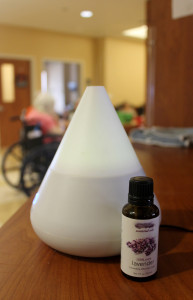
The use of essential oils has become increasingly popular in the last few years. Many are turning to these powerful plant extracts to enhance their physical wellness, purify their home, refine their skin, create spiritual awareness and inspire a positive emotional state. According to the Alzheimer’s Society, The Journal of Quality Research in Dementia, aromatic oils have been used for more than 5,000 years; “ancient Egyptians used them as perfumes and there are many references in the Bible to their use in mental and physical healing. Modern aromatherapy, which began in Germany during the 16th century, was also used successfully to treat wounded soldiers in the two World Wars.”
What is an essential oil? An essential oil is a liquid that is generally distilled (most frequently by steam or water) from the leaves, stems, flowers, bark, roots, or other elements of a plant. Essential oils contain the true essence of the plant it was derived from and are highly concentrated. Essential oils are not the same as perfume or fragrance oils. Where essential oils are derived from the true plants, perfume oils are artificially created fragrances or contain artificial substances and do not offer the therapeutic benefits that essential oils do.
In an article written by Madeleine Johnson for Science Line, a project of New York University’s Science, Health and Environmental Reporting Program (SHERP), whether aromatherapy is truly an effective alternative treatment for dementia is still an open scientific question. “Several studies have found it to be beneficial. But conclusive proof has been elusive, with skeptics noting that some people with Alzheimer’s disease or dementia quickly lose their ability to discern odors. However, other experts think both the advocates and the skeptics may be right, thanks to the unusual physiology of the human brain, aromatherapy may be working even in patients who cannot smell.”
How can essential oils be effective when a diminished sense of smell is a well-established early symptom of dementia? While there is research that says those with dementia may be uniquely insensitive to aromatherapy, some researchers explain that unlike other sensory systems –vision, hearing and touch – smells are sent straight through to the regions of the brain considered to be responsible for mood and emotion. According to Andreas Keller, a neuroscientist at Rockefeller University who studies the sense of smell, conscious recognition of smells may not be necessary for aromatherapy to have an effect.
Known as one of the safest and most versatile essential oils, lavender can often be smelled through the halls of the Sunset Home’s memory care neighborhood, the Sales Family Hope Center. The benefits of lavender essential oil include its ability to eliminate nervous tension and provide a calming atmosphere. According to the Alzheimer’s Society, The Journal of Quality Research in Dementia, “Widespread current use of aromatherapies, together with contemporary clinical data, indicate that if these oils are used carefully within the suggested directions, they can provide treatment for Alzheimer’s disease, dementia and other psychiatric disorders, without any of the adverse effects associated with some of the conventional drugs already in use.”
While essential oils have been used therapeutically for centuries to improve physical and mental health, there is still much research that needs to be done to confirm its effectiveness. In the meantime, the Sunset Home, a program of Lutheran Sunset Ministries, will do its part in testing this theory, with the hope of decreasing antipsychotic medications and providing a calm, supportive atmosphere for residents with dementia.
Sources: Alzheimer’s Association, http://www.alz.org/facts; Alzheimer’s Society, https://www.alzheimers.org.uk/site/scripts/documents_info.php?documentID=306&pageNumber=2 ; Science Line, http://scienceline.org/2011/03/lavender-and-old-lace/